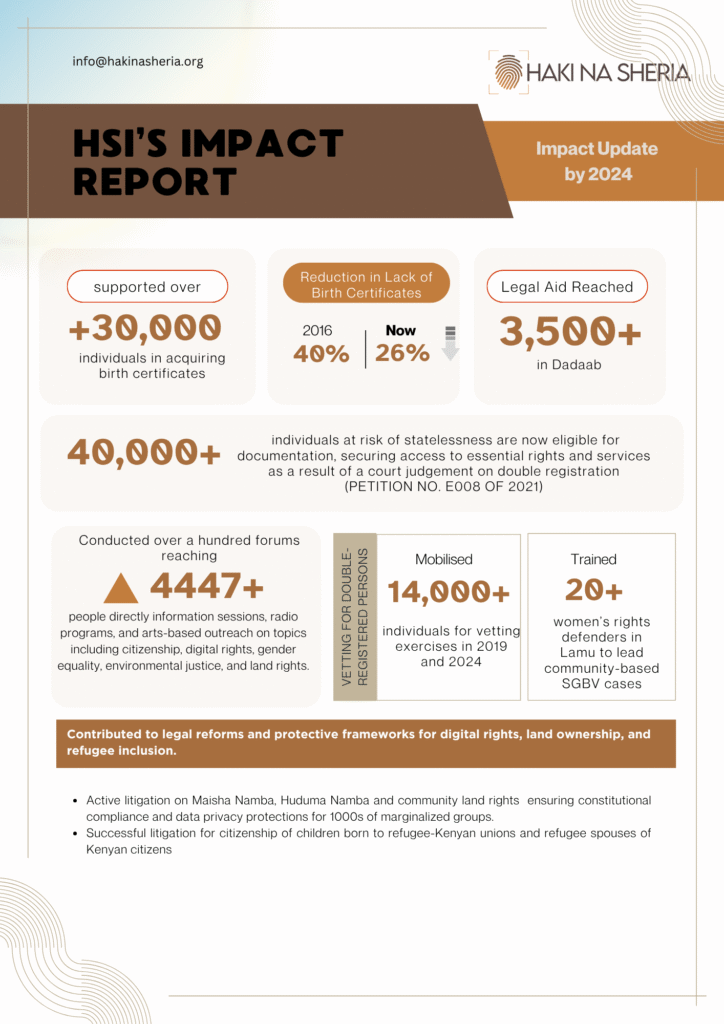Our Impact


HSI’s Impact
1. Increased percentage of residents in Northern Kenya holding legal identity documentation, enabling access to public services, education, and healthcare
We’ve supported over 30,000 individuals in acquiring birth certificates and national IDs through more than 30 mobile registration drives, legal aid, and paralegal outreach across Northern Kenya. In 2016 the percentage of people lacking birth certificates in Garissa was around 40%, now it is 26%. Given we are one of the few, if only, organisations working on citizenship in the area, this improvement can be largely attributed to our work.
2. Refugees and host communities have improved understanding of citizenship and land rights, leading to increased civic engagement and contributions to national policy reforms.
· We have provided legal aid and awareness on citizenship and land rights to 3,500+ refugees and host community members in Dadaab Refugee Camps.
· We have enabled refugee inclusion in national policy dialogues through community consultations and stakeholder engagement on Digital ID/Maisha Namba, specifically three stakeholder meetings in 2024.
3. Landmark Legal Victories in Public Interest Litigation
· 40,000+ individuals at risk of statelessness are now eligible for documentation, securing access to essential rights and services as a result of a court judgement on double registration (PETITION NO. E008 OF 2021)
· Secured KSh 5 million compensation for victims of Kenya Defence Forces brutality, the first such award in Garissa. This set a precedent for state accountability, enabling future victims to pursue justice. (https://bit.ly/Compensationforvictims)
· Successfully lifted unconstitutional curfews imposed on four counties following terror attacks in 2015 and challenged executive overreach at the Supreme Court. Restored freedom of movement and curtailed executive overreach in marginalised counties.
· Pressured the government to recruit local teachers after widespread teacher shortages in Garissa County, improving access to education in underserved areas.
4. Contributed to legal reforms and protective frameworks for digital rights, land ownership, and refugee inclusion.
· Active litigation on Maisha Namba (PETITION NO. E524 OF 2023), Huduma Namba (PETITION NO. E196 OF 2023), and community land rights (GARISSA ELC PETITION NO. E002 OF 2022), ensuring constitutional compliance and data privacy protections for marginalized groups.
- Successful litigation for citizenship of children born to refugee-Kenyan unions and refugee spouses of Kenyan citizens (GARISSA HCCHRPET NO. E011 OF 2022 as consolidated with HCCHRPET NO.E001 OF 2023).
5. Increased public awareness and agency on legal and environmental rights, particularly among women and youth
· Conducted over a hundred forums (reaching 4447 people directly), information sessions, radio programs, and arts-based outreach on topics including citizenship, digital rights, gender equality, environmental justice, and land rights.
· Trained 20+ women’s rights defenders in Lamu to lead community-based SGBV cases
6. Strengthened community-led legal aid delivery in previously underserved/last mile counties.
· Extended operations to Tana River and Lamu Counties, training community-based paralegals and improving access to legal aid in hard-to-reach areas.
7. Improved Civil Registration Infrastructure, reduced registration delays and increased uptake of civil documentation in remote regions.
· Advocated for and secured new civil registration offices in Garissa and Tana River Counties, reducing access barriers for remote communities (Link: https://bit.ly/RegistrationOffice ) .
· Provided IT support and paralegal staff to strengthen local civil registration services.
8. Facilitation of Vetting for Double-Registered Persons
· Mobilised 14,000+ individuals for vetting exercises in 2019 and 2024
· Provided legal aid and certification services to 787 individuals, and influenced procedural fairness during the vetting process.
Impact Cast Studies:
- Our public interest litigation has generated our most wide-reaching impact.
For example, our precedent-setting case on double registration enabled over 14,000 individuals in 2022 to obtain national ID cards, unlocking access to essential services and legal recognition. The remaining 26,000 are due to be (or have already been) deregistered this year, 2025, following a court order.
Similarly, our case concerning marriages between refugees and Kenyan citizens has unlocked citizenship for thousands of children born to such unions and for refugee spouses.
Our legal challenge to the Maisha Namba digital ID system could shape the future of digital identity for all Kenyan citizens and residents by embedding constitutional safeguards around data privacy and inclusion.
While several of our current cases are still ongoing, they hold the potential to transform systems and affect thousands. Our litigation on community land rights, for instance, stands to benefit entire villages in Northern Kenya by reinforcing the legal requirement for public consultation in government development projects.
- The work our paralegals carry out in the field – day in, day out, case by case – is our second major area of impact.
Since its inception, Haki na Sheria has directly supported the issuance of 12,711 birth certificates and 3,990 national ID cards across Northern Kenya, unrelated to the double registration issue. Much of this impact has been achieved through mobile registration drives and community forums, which also double as civic education platforms on legal identity, digital rights, and land registration. These large-scale events have proven highly effective in reaching underserved populations.
While smaller in volume, our door-to-door outreach has been critical for building trust, strengthening community ties, and identifying complex individual cases that require tailored legal support. To bridge the gap between scale and specificity, we are now introducing an SMS-based system that replicates the reach of our large-scale drives while capturing the depth of in-person interactions – making our outreach more strategic, data-driven, and responsive to the communities we serve.

